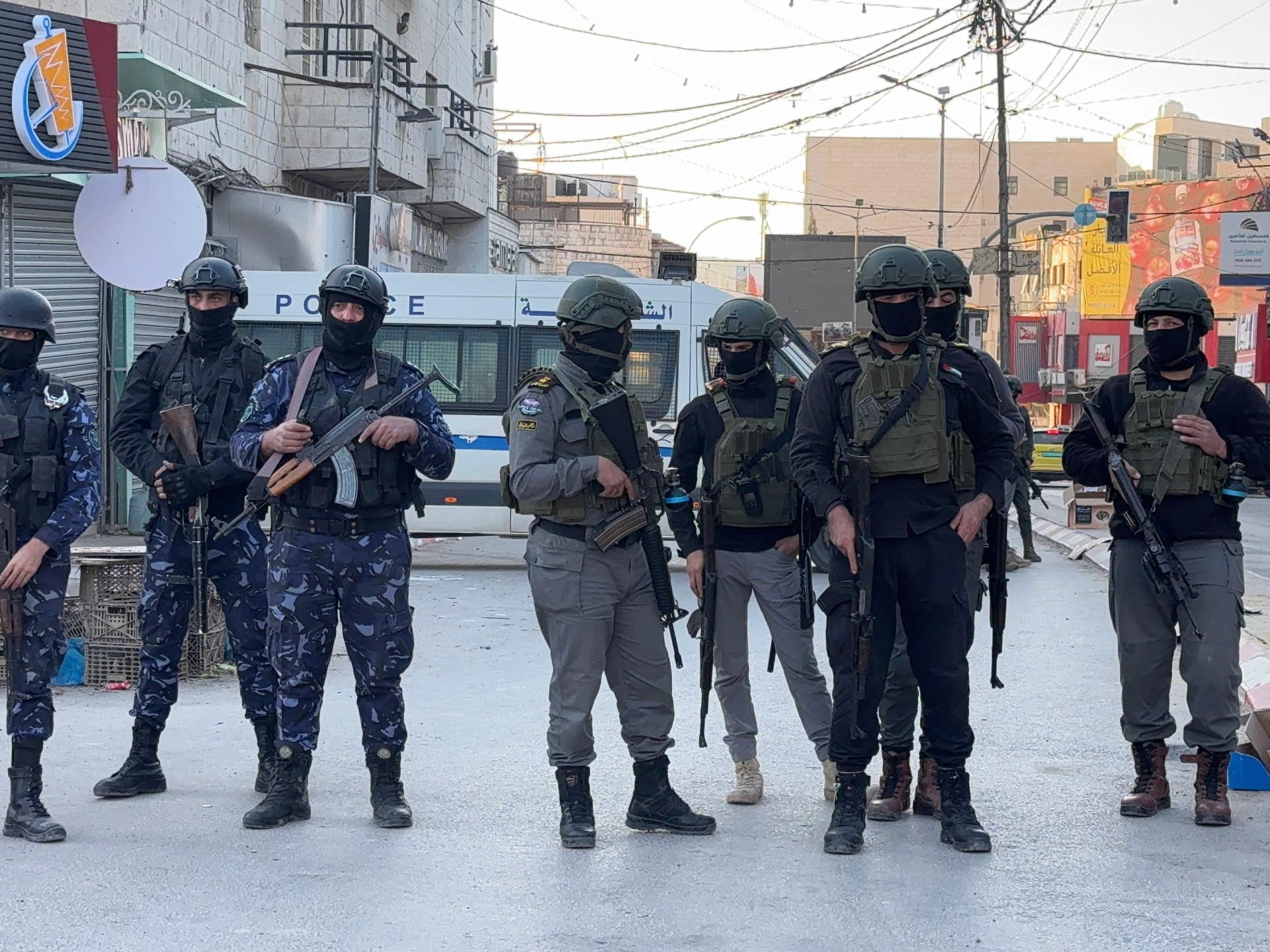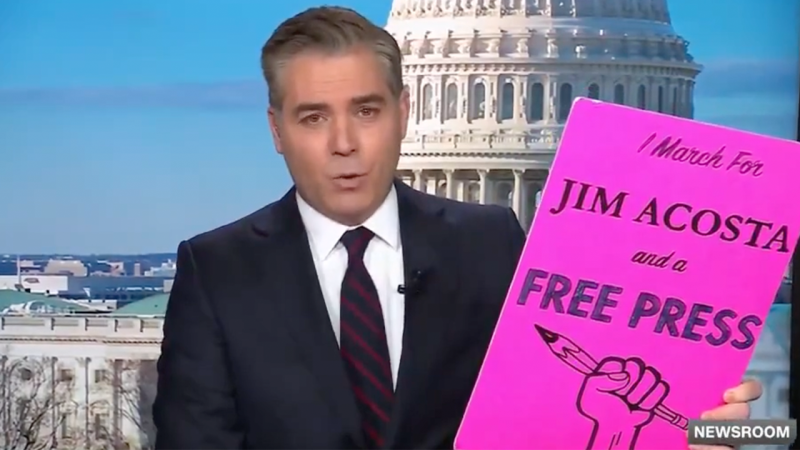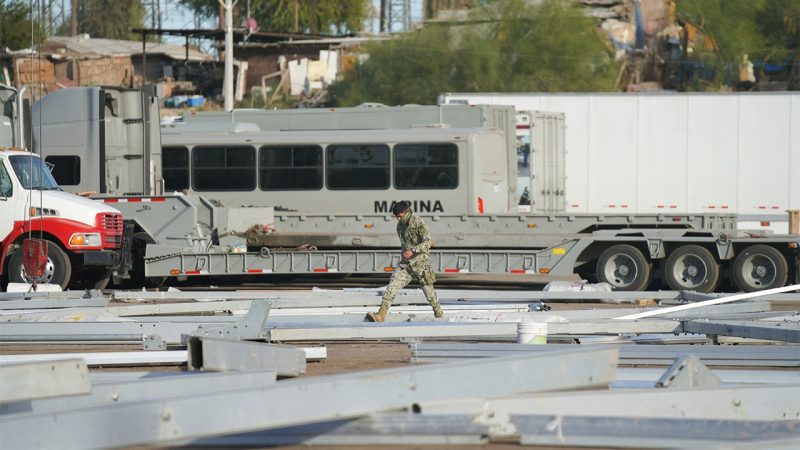Palestinian Authority refuses to back down in fight with Jenin fighters | Israel-Palestine conflict News

Jenin, occupied West Bank – Nahida al-Sabbagh has endured the battles in Jenin refugee camp, where she lives, since Saturday. The fighting between local Palestinian armed fighters from the Jenin Brigades and security forces continues near her home around the clock.
But it is the identity of the security forces clashing with those fighters that is most shocking to Nahida. They’re not Israeli. In fact, they’re Palestinian, and represent the Palestinian Authority (PA).
“We never imagined that the security forces would treat the camp like this,” the 52-year-old Palestinian woman said.
The clashes around the al-Sabbagh family’s home in the camp’s al-Mahyoub neighbourhood are the result of an ongoing campaign launched by the PA’s security apparatus under the name “Protecting the Homeland”. The campaign has been justified as an effort to “pursue criminals” and lawbreakers and prevent the camp from becoming a battleground like Gaza, according to Anwar Rajab, the spokesperson for the PA security forces.
Rajab has also characterised the fighters in Jenin as pro-Iranian and “mercenaries”, and aiding the Israeli far-right’s attempts to weaken the PA.
The Jenin Brigades, the main target of the PA, has ties to the Iran-backed Palestinian Islamic Jihad, but also has members affiliated with other Palestinian groups.
“What they are doing is creating areas outside the control and sovereignty of the Palestinian Authority,” Rajab told Al Jazeera, referring to the Palestinian fighters being targeted in the PA’s operation. “This is evident in their rejection of any presence of the PA and its apparatus inside the camp, [thus] serving the agendas of external forces that were responsible for the destruction of Gaza, Lebanon, and Syria.”
The PA raid on the camp, which began on December 14, followed a 10-day siege. During that period, security forces killed an unarmed 19-year-old civilian, Rabhi al-Shalabi, in the camp as he rode a motorcycle, a scene captured on camera that led to widespread outrage. Then, on the day the raid began on Saturday, a 13-year-old child, as well as a commander in the Jenin Brigades who was wanted by Israel, were also killed.
The PA took “full responsibility” for the killing of al-Shalabi, but no immediate action was announced to arrest the officers involved or refer them to the public prosecutor for investigation, further raising the anger on the streets.
The justifications for the operation have failed to convince the 24,000 Palestinian refugees living within the half a square kilometre (0.19sq miles) that makes up the densely populated camp. These residents have endured more than a year of Israeli incursions and raids, and many see the campaign as an attempt to eliminate the Palestinian resistance, in line with the PA’s security coordination with Israel.
Although this is not the first such PA campaign against Jenin camp, it is the first during Israel’s war on Gaza and amid ongoing Israeli attacks on the camp, which has been raided more than 80 times over the past year, resulting in more than 220 deaths and thousands of injuries, according to the Palestinian Ministry of Health.
Fadi expressed his outrage to Al Jazeera at what he described had happened to him. The 42-year-old said the security forces stormed his building and forced nearby residents to leave their homes, detaining them in his apartment.
“They fired at me, terrifying my children, just because I was on the balcony. And they didn’t stop there – they forcibly entered my home,” Fadi said, recounting how his children and his neighbours’ children were terrified, and how he is wanted by the PA security forces after appearing in a video on social media speaking about his ordeal.
Fadi is adamant that despite the PA’s claims, the camp is fully supportive of the Jenin Brigades.
“Anyone who doubts the popular support for resistance in the camp should visit now and see the public rallying around it,” Fadi said. “No one here will give up the resistance.”
Palestinian Authority refuses to compromise
The PA has partial administrative control over the occupied West Bank – which Jenin sits in the northern part of. However, Israel has had full military control over the Palestinian territory since 1967.
Over the past few days, the Jenin camp has been under PA siege, with no movement in or out, along with electricity and water cuts. The medical situation is dire, with ambulances unable to enter or exit, despite the large number of injuries from ongoing clashes between the two sides.
Despite the difficult situation inside the camp and the intense fighting, security officials remain committed to continuing the operation.
PA Interior Minister Ziad Hab al-Reeh reiterated during a meeting at the Jenin governorate’s headquarters on Wednesday that the operation would continue until its objectives were achieved.
“We will pursue anyone who tries to tamper with our people’s resources and sabotage the Palestinian national project,” Hab al-Reeh said.
Some camp residents agree with the objectives of the campaign but reject the methods used by the security forces.
Hani Hijazi, 54, who lives on al-Sikka Street in the western part of the camp, said he understands the need for the security forces to operate within the camp and address issues that have arisen, but not through the methods that have led to the deaths of innocent civilians.
Hijazi, like many others in the camp, fears that this could escalate into a larger confrontation between the two sides, potentially leading to a “civil war”.
“Both sides are responsible; fighting is not the solution. Reconciliation is,” Hijazi said.
Justifications for operation ‘untrue’
Amid the rapidly escalating events in the camp, residents have questioned the timing of the PA’s operation.
The Jenin Brigades was formed in 2021, and although the Islamic Jihad movement comprises the largest portion of it, all Palestinian factions are represented in its military wings, including the Al-Aqsa Martyrs Brigades, the military wing of Fatah – the Palestinian faction that dominates the PA.
Moreover, Israel has repeatedly raided the camp, and the pursuit of armed fighters has not ceased.
Kifah al-Omari, 51, a resident of Bab al-Saha in the centre of the camp, wondered to Al Jazeera why the PA would intervene.

Al-Omari sat outside her home with her family as she spoke, warming herself by a wood-burning stove due to the electricity blackout in the camp and the lack of heating in its homes.
“We, the ones living in the heart of this event, know very well that all the justifications provided by the PA are untrue,” al-Omari said. “This leaves us to speculate about the real reason for this campaign and its timing.”
Like many other Palestinians, al-Omari did not rule out that the cause might be linked to major political arrangements in the occupied West Bank and Gaza, preparing the PA to extend its control over Gaza in the event of any agreement to end the war on the enclave.
The Israeli government has repeatedly stressed that it does not trust the PA to effectively fight Palestinian resistance fighters, and so many Palestinians believe that operations such as the one in Jenin are an effort to prove that the PA can in fact root the fighters out.
Rajab, the security forces’ spokesperson, rejected accusations that the PA is working with Israel against resistance fighters, saying the PA had “provided protection for 200 Palestinians who were targeted for liquidation and immediate assassination by Israel”.
“It is a sovereign decision from the highest level within the PA to work with all our efforts, means, and methods to prevent another catastrophe and disaster in the West Bank, as happened in the Gaza Strip,” he added, in a further attempt to justify the raid.
Yet al-Omari claimed that offers from locals in the camp have been made to the PA to resolve the situation without bloodshed, but that these had been refused.
Instead, al-Omari said, the PA had demanded that “wanted individuals surrender themselves and their weapons”.
“This demand was not accompanied by any guarantees or offers to protect them or the camp from Israeli occupation forces, which is why the fighters and camp residents rejected it,” al-Omari added.





